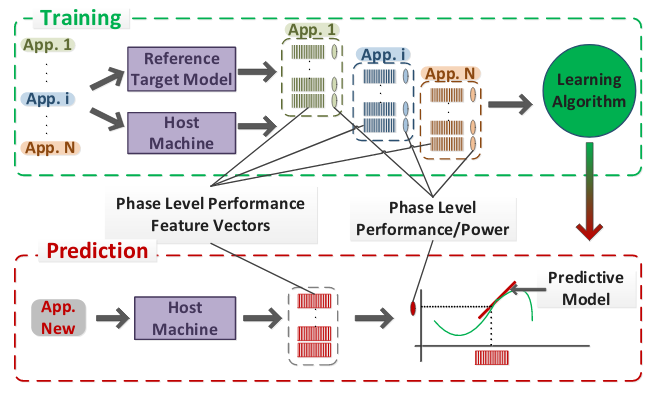Predictive Modeling for Next-Generation Heterogeneous Computer System Design
Project Overview

With semiconductor scaling reaching physical limits, performance and power consumption are ever more critical aspects in the design of emerging computer systems. Next-generation systems ranging from small embedded devices to city-scale data centers are expected to contain a heterogeneous mix of multiple CPUs, GPUs, FPGAs, accelerators and memory stacks all in the same package or die. This poses fundamental new challenges for designing, programming and managing of such systems. Fast and accurate power and performance models of architectures and the applications running on them are essential for evaluating design options before systems are built. With increase in complexity of systems and applications, traditional simulation-based or analytical modeling approaches are rapidly becoming too slow or inaccurate to be feasible.
This project aims to investigate use of advanced machine learning-based, predictive methodologies to rapidly estimate the performance and power consumption of future generation products at early design stages using observations obtained on commercially available silicon today, specifically to aid in heterogeneous system design, programming and runtime management. Such techniques will allow efficient design cycles ensuring that the next-generation computing infrastructure meets the consumer and society's needs. In addition, the project will be complemented by educational, outreach and active industry collaboration and technology transfer activities.
Selected Publications
-
Erika S. Alcorta, Pranav Rama, Aswin Ramachandran, and Andreas Gerstlauer, "Phase-Aware CPU Workload Forecasting," Proceedings of the International Conference on Embedded Computer Systems: Architectures, Modeling and Simulation (SAMOS), virtual conference, July 2021.
[
 pdf]
pdf]
-
Dongwook Lee and Andreas Gerstlauer, "Learning-Based, Fine-Grain Power Modeling of System-Level Hardware IPs," ACM Transactions on Design Automation of Electronic Systems (TODAES), vol. 23, no. 3, pp. 30:1-30:25, February 2018.
[
 pdf]
pdf]
-
Xinnian Zheng, Lizy K. John, Andreas Gerstlauer, "Accurate Phase-Level Cross-Platform Power and Performance Estimation," Proceedings of the ACM/IEEE Design Automation Conference (DAC), Austin, TX, June 2016.
[
 pdf]
pdf]
-
Wooseok Lee, Youngchun Kim, Jee Ho Ryoo, Dam Sunwoo, Andreas Gerstlauer, Lizy K. John, "PowerTrain: A Learning-based Calibration of McPAT Power Models," Proceedings of the ACM/IEEE International Symposium on Low Power Electronics and Design (ISLPED), Rome, Italy, July 2015.
[
 pdf]
pdf]

